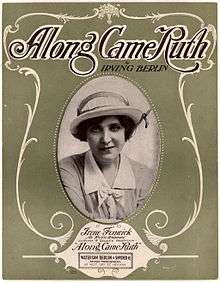La Demoiselle de magasin
La Demoiselle de magasin (The shop girl) is a 1913 theatrical play in three acts written by Belgians Frantz Fonson and Fernand Wicheler.[1]
Plot
An orphan girl, Claire, arrives in Brussels, Belgium, finds work in a furniture shop and rents from Monsieur Derrider, the shop's owner, a room upstairs to live. She proves to be an excellent salesperson, thus overcoming Derrider's initial misgivings about her, but Claire and Amelin, the shop owner's son, fall in love.[2]
History

The play was first performed at the Théâtre du Gymnase in Paris, France, on 13 February 1913, featuring actors Jane Delmar as Claire Frénois, A. Jacques as Deridder, and Edmond Duquesne as Amelin.[1]
An English-language theatrical version, Along Came Ruth, was written by Holman Day and Fonson and produced by Henry W. Savage, featuring Irene Fenwick as Ruth Ambrose.[3] Irving Berlin wrote a song, called "Along Came Ruth", for the play.[4][5] It opened at the Gaiety Theatre on 23 February 1914.[5]
Along Came Ruth was then adapted into a 1924 silent movie, directed by Edward F. Cline and starring Viola Dana.[3][6]
A Spanish version entitled La señorita del almacén was published at Madrid in the year following its premiere at the Victoria Eugenia Theatre in San Sebastián on September 26, 1913, as translated by Spaniard writer Sinibaldo Gutiérrez.[7]
Critical reception
In Revue des deux Mondes, the play's authors, and particularly Fonson, were credited with introducing in France the theatre of Belgium and allowing "the French spirit to acknowledge Wallonian verve and good humor," noting that both Fonson's plays staged in France, Mademoiselle Beulemans and Demoiselle de magasin, were "popular successes."[8]
In 1924, the play was staged at St. James Hall in Sydney, Australia, where, according to a review, "the story of the clever shop girl unfolded with considerable vivacity."[2] In L'Express du Midi, after a theatrical company toured in 1926 the south of France with it, the play was said to "refresh the soul" of the reviewer.[9]
See also
- La Demoiselle de magasin, painting by James Tissot
References
- "The performance : La demoiselle de magasin" (PDF). The French National Library. Retrieved 27 July 2018.
- "Review: La demoiselle de magasin". Sydney Morning Herald. National Library of Australia. 14 August 1924. Retrieved 28 July 2018.
- "Dramatic Compositions Copyright list". Catalogue of Copyright Entries. 11 (1): 239. 1914. Retrieved 27 July 2018.
- "Along came Ruth". Library of Congress. Retrieved 27 July 2018.
- Hamm, Charles (13 March 1997). Irving Berlin: Songs from the Melting Pot: The Formative Years, 1907-1914. Oxford University Press. p. 210. ISBN 978-0-19-536114-8.
- "Along Came Ruth (1924)". Catalog of Feature Films. American Film Institute. Retrieved 27 July 2018.
- Fonson, Frantz; Wicheler, Fernand (1914). La señorita del almacén (in Spanish). Translated by Gutiérrez, Sinibaldo. Madrid, ES: Sociedad de Autores Españoles. p. Title page. OCLC 11914606.
Comedia en tres actos y en prosa original de Franz Fonson y Ferdinand Wicheler ; traducida por Sinibaldo Gutiérrez ; Estrenada en el TEATRO VICTORIA EUGENIA de San Sebastián, el 26 de Septiembre de 1913, y en el TEATRO LARA de Madrid, el 28 de Noviembre del mismo año
- Doumic, René (1915). "Revue dramatique" [Drama review]. Revue des deux Mondes (in French). 27: 457–468. Retrieved 27 July 2018.
- "Courrier Artistique" [Artistic Courrier] (PDF) (in French). L'Express du Midi. 30 March 1926. p. 4. Retrieved 28 July 2018.